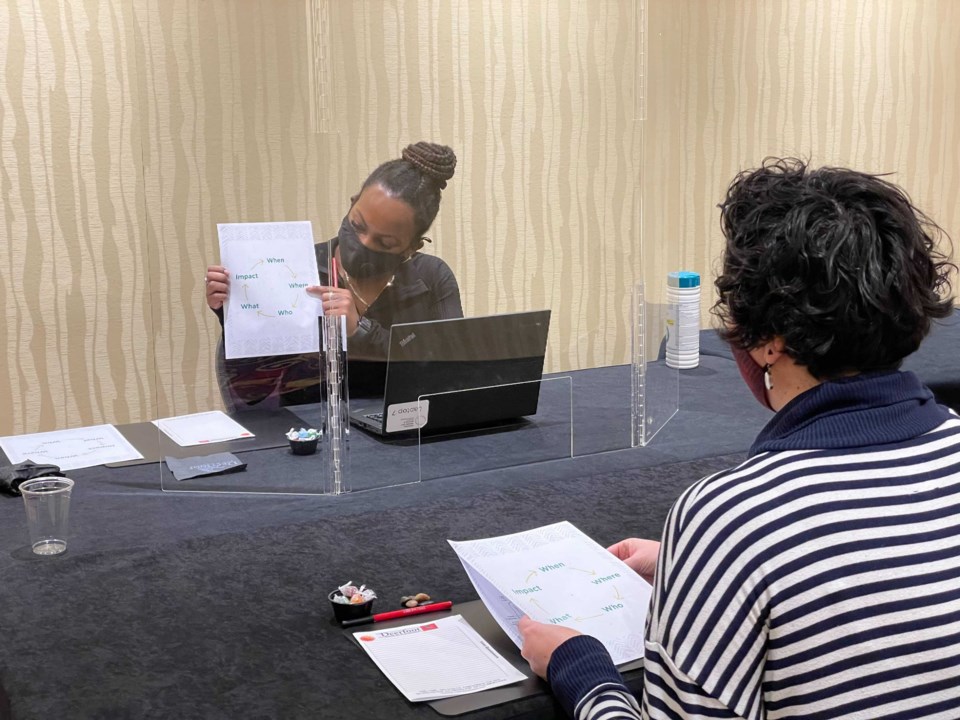The deadline for people who attended a federal Indian Day School to file a claim for compensation is approaching. But the arrival of Community Support Sessions to Timmins this week aims to make the process comprehensible, smoothed out and emotionally supported for anyone still feeling hesitant.
People who went to the federally run schools during specific periods and experienced harm are eligible for compensation. The deadline to apply is July 13.
The Federal Indian Day School Community Support Program offers free one-on-one support services and is in Timmins at the Senator Hotel on April 22 from 9 a.m. to 5 p.m.
"The folks who haven't submitted yet tend to be the ones that are really struggling, it's hard. It's a hard thing to go through, for folks to tell their stories. Sometimes for the first time. Now more than ever this program is important because folks need to know they don't have to go through this alone. We provide wellness support, we provide cultural support, we provide legal support, all free of charge, to try to make it a one-stop-shop for claimants who are filing their form," said Jill McLean, Indian Day School Community Support Program program director.
McLean stressed that the process can take longer than a single session, with follow-ups possible via phone, video call or an additional session. The community sessions themselves can also be held virtually for anyone with concerns about COVID-19. Appointments can be booked for this week's session, but the program workers are also happy to take walk-ins.
Local elders and other support figures will be on-hand to tailor the sessions to the local community and ensure a friendly atmosphere. People arriving at a session will be given a direct, one-on-one meeting with the goal of making them feel personally supported in their efforts either for their own claim, or a claim on behalf of a deceased relative.
"Folks show up and walk through the doors, are greeted by a local friendly face and offer folks something to eat and something to drink, then take them through an intake process," said McLean, noting the intake process helps establish qualifications for claims.
The sessions are also available for those who have already filed claims to check on their information and status.
A goal of the support program is to give a chance to those who have suffered harm not to settle for the lowest default settlement, with an offer to help establish and witness sworn declarations and narratives that would allow for higher claims despite a lack of relevant ID or other evidence (though if those IDs exist, the program workers do recommend bringing them along).
"If anyone's worried about, 'Hey, I don't have all the evidence or all the proof' or anything like that, they should still come in, they should still submit a form. The process is such that they can fill out a sworn declaration and don't need all that," said McLean.
The program also offers aftercare support, from sitting with an elder afterwards, to follow-up phone calls.
In the region, people who attended these schools could qualify for the compensation:
- Abitibi
- Albany River — also known as Albany Mission, Albany or Albany North River — in Kashechewan
- Attawapiskat — also known as Attawapiscat, J.R. Nakogee
- Constance Lake — also known as Constance Lake Church of England
- Kashechewan School — also known as St. Andrew's Kashechewan Elementary
- Moose Factory No. 2 in Moose Factory
- Moose Fort in Moose Fort Reserve in James Bay
- Moose River, Moose River Post/French Post near Moose Fort
- St. Anne's — also known as St. Ann's Fort Albany or Sinclair Island School — in Fort Albany
- Weeneesk — Also known as Weenusk, Weenick, Winisk or Muskegog Keewaytin — in Weenisk (Peawanuck)
The full list with dates is available here.
People who can't make this week's session can call 1-877-515-7525.
To book an advance appointment for the sessions, follow this link.
A 24-hour national residential school crisis line, established to provide support to former students and their families, can be accessed at 1-866-925-4419.



